Existing User Log In
New User Registration
Register for a free account to gain full access to the VGChartz Network and join our thriving community.





America - Front


America - Back

As a child the Harry Potter franchise was huge. I was given a copy to read around the age of seven, but was initially reluctant to read the book, as I felt like believing in magic or anything mythical was for “children”. Eventually I began reading and, despite my cavalier attitude, became obsessed. In the years to come I consumed every piece of Harry Potter media that my family could reasonably afford. I would try to read the books as soon as they were available, and prepare for the next installment of the books and movies by reading or watching all previous entries leading up to the new one. Unfortunately, my life became quite complicated when the final book was coming out in 2007; I didn't end up following my usual routine, and didn’t read the new book at all. When the movies came out I refused to watch them without reading the books, and to this day I have read and watched the entire series of Harry Potter books and movies almost ten times over, with the exception of the Deathly Hallows. I’ve also carried with me a fickle attitude towards the series which I have yet to cure. I continue to avoid any and all potential spoilers regarding the series in hopes that one day I’ll finally finish it, but the idea of re-reading the entire series in order to gain the context of the story again is much too daunting for a graduate student who spends their “free time” reading textbooks and studying.
That’s what makes Hogwarts Legacy so appealing for me. This is a modern Harry Potter game that doesn't contain any risk of potential spoilers for a fifteen year old book that I have yet to finish. I can finally re-experience Hogwarts and delve deep into its locales, creatures, and mythos as a test to see if this franchise still holds the magic over me that it once did.
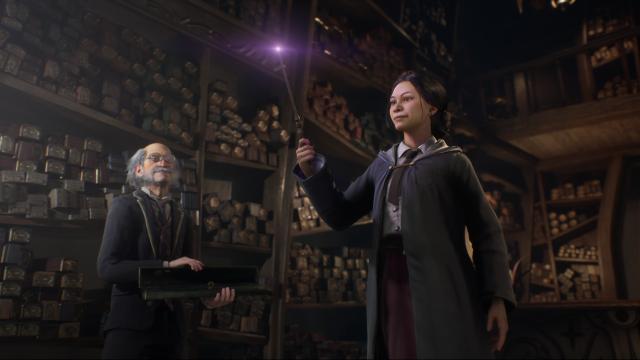
Now, before I get too deep into this review I do want to provide a disclaimer: I will not be making any socio-political commentary on J.K. Rowling or any other associated controversy for this game. My personal opinion is that my role here is not to impart you with my own socio-political viewpoints of circumstances, content, or events that aren’t directly in the game. Instead, my role is to describe the quality of the game’s content and my experience with it as I see it, so that is where I will focus.
When you first begin Hogwarts Legacy you're given an opportunity to customize your character. You start with a preset of your choosing, but are able to customize this preset in any way that you see fit. You can choose the basic face shape, hair type, eyebrow type, hair color, complexion, whether you want scars, glasses, a masculine voice (labeled voice 1) or a feminine voice (labeled voice 2). You can even change the pitch of these voices, so you can make voice 1 sound very high pitched or voice 2 sound very low pitched. Though these do seem to be just very basic pitch effects - and you can tell they're the same voice just altered - it’s still a nice option for those who want to use it. You’ll then choose whether you want to be a Witch or a Wizard, which as far as I can tell really only changes the type of dormitory you have. As a guy with a beard I was disappointed to see that beard options are missing, but your character is really only supposed to be 16 at this point, so it’s not exactly unexpected.
You're then dropped directly into the story, which starts off with a bang - pretty much literally. You're blown directly out of the sky within just a few short minutes and, rather instantly, thrust into a plot surrounding ancient magic and racial tension between humans and goblins. Though the story is initially rather exciting, I found my interest in the overarching plot diminishing ever so slowly as I continued the main story. It's not awful, but I found the side quests to generally overshadow and consume more of my interest. Some are very light-hearted, such as a quest where you're tasked with rescuing a portrait's second frame from bandits in order for him to be hung up at the Three Broomsticks just in time to eavesdrop on all the hot wizarding gossip. Others are much less light-hearted, or even downright sad.
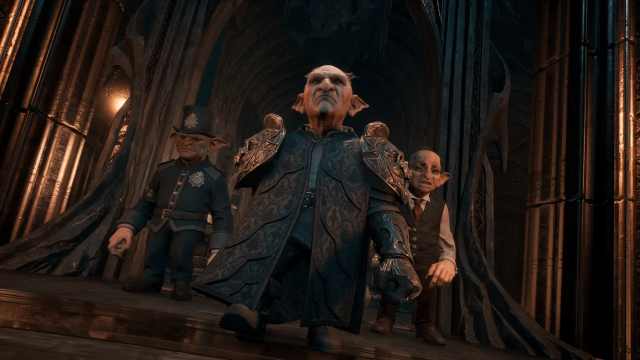
You often interact with NPCs and have the option to choose your dialogue to gather more information, or simply to “express your personality”. I opted to choose more valiant, humble, and tactful dialogue, but the developers included some pretty funny bully-type responses if that’s more your style. It becomes quickly apparent that most dialogue options aren’t that meaningful, so this isn’t a Mass Effect-esque experience where your choices actually affect the outcome. That's not to say that there is no effect of certain dialogue responses, but nothing I’ve done appears to have affected the main story at least.
The variety and depth some of the characters have here is much more entertaining than I expected. The game provides some context or information on historical characters in the Harry Potter universe that are known and were mentioned in the books through both interactions, story sequences, and field guide pages, as many had hoped. But even new characters are given complex back stories that help them feel fully-fleshed. One student was forced to use Crucio, a tormenting curse, on people before being tortured by it himself. Another student was born to poachers, but decided to reject the lifestyle and left her parents, ironically becoming a bit of a social outcast with human beings and striving to care and protect all manner of animals from any type of danger, including her own parents.
Even just wandering around Hogwarts you can listen to side conversations and NPC interactions that range from mildly entertaining to completely unanticipated. There were a few times when I thought that overhearing a conversation would actually trigger a quest, but they were really just there to flesh out the world. This is honestly one of Hogwarts Legacy’s biggest accomplishments. There are small, but very important details in the game, such as the first time you're able to see a Thestral. But there are even smaller details that the developers could have completely missed. For example, Wizards can’t access Witches' common rooms, but Witches can access Wizards' (something that is referenced in Book 5). In this sense, Hogwarts Legacy is as fully-fleshed and as part of the franchise as any of the books. Most characters truly feel like they belong in the Harry Potter universe, and the detail that is put into the conversations, mythos, history, and overall world detail is not only surprising, but a feat of true knowledge and passion regarding the series from the developers.
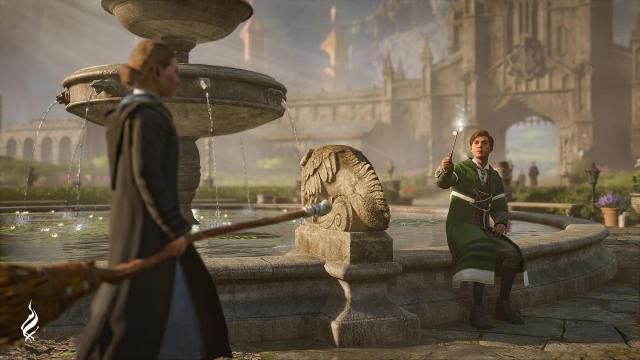
Outside of the franchise-specific details, there are a host of other impressive inclusions that help the world feel more alive, some of which are so very easily looked over that their inclusion at all had me doubling back. Of course, this goes beyond self-cleaning brooms or floating watering cans. Tipping a local musician means that the next time you see him he'll have a new instrument to play. People will make fun of you for the clothes you're wearing. A whole host of random interactions can occur while you're just exploring that simply didn’t have to be included by the developers, so the fact that they were left me with a feeling of delicate but passionate work having been done by the development team. That said, there are some inconsistencies that feel out of place. One example is the fact that jumping into a body of water doesn’t make your character look wet. You’ll come out just as dry as when you jumped in. Sure, this may seem a bit nitpicky here, but when so much time and dedication has gone into other less noticeable things I wonder why the developers skipped over things like this.
Graphically, Hogwarts Legacy can be a surprisingly mixed bag at times, though it is generally good-looking. I appreciate the semi-realistic look that the developers took, as it allowed them to mix realistic lighting, materials, and shaders together while still making the game feel rather fantastical, without causing any jaring mismatch or impression of clashing art styles. The characters have a large amount of polygons for a smooth appearance, and the animations for their bodies is generally very good. The environments are detailed and dense, without any obvious repetition in the landscape. I also appreciate the effects on display: Magic incorporates striking particle effects that are handled very well within the game engine; there's good use of volumetric fog and crepuscular rays that really help the environments appear suitably moody or dramatic; and there appears to be a mix of real time lighting and baked lighting, most notably present indoors.
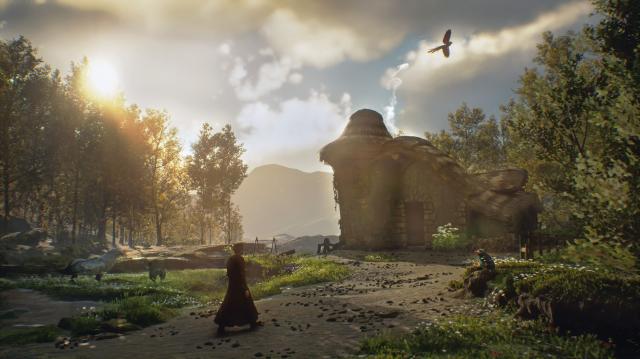
Baked lighting in particular looks great, with the developers often taking artistic design to mimic the look of bounced lighting, but the real time lighting model isn’t particularly good. Though there are times when Hogwarts Legacy looks fantastic, it can be very apparent when you step into an area that isn’t incorporating any kind of baked lighting because it simply looks off. The game does feature a lot of graphical detail overall, but it still carries a bit of a “last generation” feel. Facial animations are stiff, lighting transitions (e.g. moving from outside to inside) are jarring, and some of the rendering techniques at play just aren’t particularly impressive. Still, I feel the developers chose an art style that works with Unreal Engine 4 to present an attractive product.
The sound design is a bit inconsistent. I’ve noticed very fun details that impressed me, such as one cut scene that has the player putting in ear protection right before pulling a mandrake out of a pot. The professor initially sounds loud, crisp, and clear, but this becomes slightly muffled and lower in volume once you see your character put in the ear protection. The more common effects from spells or actions in the main world are appropriately punchy or satisfying, and the musical score is well composed with a suitable “Harry Potter” feel. Yet, some of the more subtle elements of sound design just don’t live up to the rest of it. The sound of footsteps doesn't match the environment (e.g. walking on snow sounds the same as walking on mud), there doesn’t seem to be any simulation of acoustics, and the game's proximity effect feels just a bit too harsh. If you aren’t within a five to ten foot radius of the camera focusing on a particular character, then they may as well be a hundred feet away.
The voice acting is also not particularly great. Some characters are better than others, which is to be expected, but the main character's voice acting never felt believable to me. Several other characters express affect which just doesn’t match with the content of the dialogue, and one notable character (who shall remain nameless) was so annoying that I was hoping they would be delegated to the most minor role that they possibly could so I wouldn’t have to hear them.
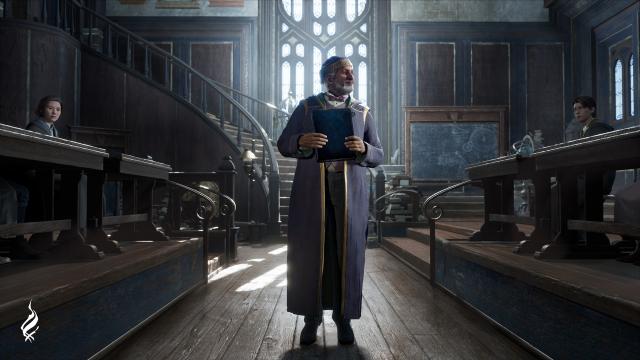
I’ve been playing on PC, so let’s dive into the graphical options that are available. At first glance, I was very impressed. You compile shaders before you start, thus hopefully subverting shader compilation stutter for a smoother experience. Graphical options clearly label their impact (e.g. VRAM, CPU, GPU); they provide preset recommendations based on your GPU, and there are a variety of upscaling options (e.g. FSR 2.0, XeSS, DLSS, and even NIS). It definitely feels more robust than some other recent PC games I’ve had the displeasure of dealing with. Unfortunately, my positive first impression with the graphical options and features overall didn’t last long. During the launch window it didn’t even seem to matter what graphical settings I was using because my framerate was just awful. I was getting between 15-25FPS at times on an RTX 3070 with DLSS set to balanced, graphics preset on high, and the resolution set to 1440p. When looking at my performance I noticed my VRAM utilization was at 100% no matter what I did. Lowering the resolution and texture quality - both VRAM intensive - didn’t have a significant impact. I quickly realized this must be some memory leak issue and I’d be stuck with bad performance until a patch came through. Entire graphical features didn’t work either. Raytraced ambient occlusion and shadows weren’t functioning (with RTAO actually looking worse than SSAO), and raytraced reflections caused weird artifacting with reflections that weren’t even present on all reflective surfaces. I encountered glitches and bugs ranging from NPCs being stuck on invisible walls to asset stretching, and even some crashing. To add insult to injury, the game originally required you to restart if you changed your graphical options, making it incredibly time consuming to come up with an optimized experience.
Of course, the developers did issue patches to fix many of these issues and a lot of my complaints regarding the graphical options. The memory leak issue I described seems to have been mostly resolved, though the title is still pretty VRAM intensive. Raytraced ambient occlusion and shadows are actually functional, and raytraced reflections have been improved. Though I wouldn’t necessarily say that the raytraced reflections are particularly good, as they're still low resolution, it's nice to see that this has been fixed. I’m also able to update my settings without having to completely restart the game too. I know some may think that complaining about issues that have been fixed or substantially improved is ridiculous, but I think it's important to provide context as to what the early experiences with this title were on PC. Those of you who may have tried to play Hogwarts Legacy near launch, or who have a friend who warned you about performance issues, can rest easy knowing that it’s a much better experience now. I do, however, firmly believe the game should not have launched in the state it did initially.
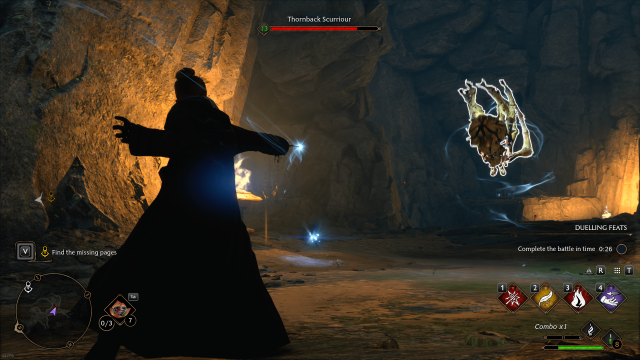
I can definitely see some of the modern game design that has influenced the general gameplay of Hogwarts Legacy. That said, the implementation of this design doesn’t feel copied and pasted from other games. Think less “derivative” and more “inspired”. Combat incorporates basic attacks, parries, and dodges with the on-screen icons which, when timed well, help you either counter or, when unblockable, simply not get hurt. Items and potions can also be used to cause damage, stun enemies, or apply a combat buff. This all sounds very similar to most open-world titles on the market, but the incorporation of spells allows the combat to stand out amongst its peers. In addition to basic attacks you're given spell sets (only one initially, but you can unlock up to three more), each with four spell slots that can be customized with spells of your choosing. I suppose you could call these “loadouts” which can be swapped quickly in the middle of battle for flexibility. You can also customize your spell slots in any way you want right in the middle of a battle if the loadout you have just isn’t working for you.
Spells come in a variety of types as well. These varieties are: control, transfiguration, damage, utility, force, essential, and unforgivable (yeah, you know the ones). Some of these spells are simply not for combat, so you’ll have to be careful about which loadout you are using when fighting. You also need to balance your loadout between force, control, damage, and other spells. Enemies will have specific protection spells that can only be canceled by hitting them with the appropriate type of spell. Spells also have a cooldown time, so you can’t spam them. This really helps with engagement in combat. Paying attention to which spells you need to use and which order to use them in, while ensuring you're avoiding other enemies and blocking their attacks, creates combat that feels exciting, challenging, and generally very entertaining.
That said, the spell system isn’t perfect. Outside of a few isolated examples, non-combat spells must be equipped into a spell slot in order to be used. This also includes some utility actions that are required if you want to try and capture any mythical beasts, and even the spell you use for stealth. More than once I was either equipped with the wrong loadout, which gave the poor puffskeins I was trying to capture quite a scare when I accidentally sent a fireball at them, or I simply didn't have the right spell equipped to do what I needed to quickly. With 34 total spells, you either have the option to sacrifice precious slots and combat abilities in order to have these other spells on hand during general exploration, or you'll be having to do a lot of loadout customization in the menu throughout. Neither choice feels particularly great, though to be fair to the developers I couldn’t really think of a better system while I was playing the game.

Hogwarts Legacy features an armor system. Clothing items can improve your health and armor, and do, indeed, affect your appearance. Luckily, you can manually choose a specific style of clothing while keeping the associated stats, so your character doesn’t look too goofy (or looks extra goofy, if that’s what you like). You can also unlock specific styles by completing challenges. Unfortunately, instead of a dedicated button to press in order to use the stats of a piece of clothing without changing your look, you'll have to do this yourself by putting on the piece of clothing, pressing the button in order to choose your style, and then selecting the style you want. Though this is a minor nitpick in concept, the amount of clothing that you collect is so high that you'll find yourself going into the menu to change quite frequently as it is. Implementing a very quick way to keep a style would have at least prevented an already rather interrupting gameplay experience from being even more clumsy. Of course, you could simply not care about the way that you look, but then you risk the “fashion souls” police arresting you, and that’s just not a risk I’m willing to take. Later in the game you're also able to upgrade clothing for improved stats and equipping traits for specific bonuses, like reducing damage from a specific creature or increasing the damage of specific spells. The traits and upgrades help reduce the need to constantly swap gear, though I personally felt that the option was given a bit later in the game than I would have liked.
There's also a leveling system. Initially, leveling up just means an increase in your health and defense, which isn't particularly impactful since enemies tend to scale with your level. At a certain point in the story, however, you're given one talent point per level after level five. Each talent point can be used to upgrade specific combat abilities, improve stealth, reduce cooldowns, and on and on. It’s not robust, but it works.
The real treat is learning new spells. You’ll be given quests throughout your journey at Hogwarts which will teach you a variety of spells. Some are absolutely essential, such as alohomora. A few are entirely optional, like the unforgivable spells, and you may not actually get the chance to learn them if you’ve made very specific dialogue options. The game provides a very steady stream of new spells throughout, which reduced any feeling of combat tedium because I was always excited to change my loadout for a new spell. Hogwarts Legacy also incorporates combat challenges to complete, as an extra incentive to use spells in new ways instead of relying on the tried and true.
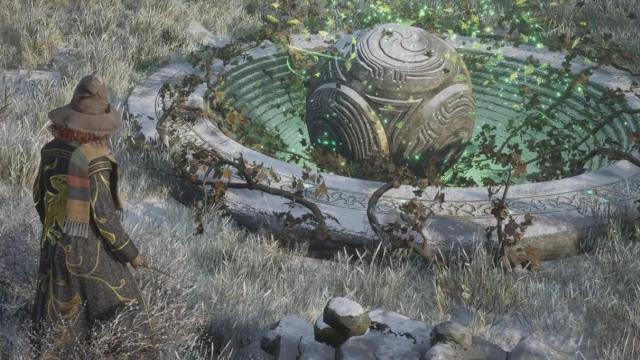
Exploration may be the surprising highlight of Hogwarts Legacy, because of the great environments, but also because of the incorporation of puzzles, collectibles, and challenges. Yes, there are quite a number of collectibles at play here, yet they feel more unique than the cookie cutter way that some other developers implement them (not to name names). First of all there are field guide pages to find, which provide insight and lore into Hogwarts, specific people, and the wizarding world overall. Collecting these pages involves using revelio within a few feet of an invisible page or solving a variety of puzzles. The hidden pages are by far the worst collectible that Hogwarts Legacy features, but even then talent upgrades and the occasional map icon can reduce some of the tedium. It’s really the puzzles that shine here. Puzzles range from using specific spells, finding specific locations, or solving “riddles”. Some of them you won’t be able to solve until later in the game. To help the player not feel so overburdened with the sheer amount of collectibles and puzzles on display, the developers have wisely chosen to slowly integrate them throughout the game. Because of the way many of the puzzles function, I get a bit of a Breath of the Wild vibe. This was very salient when one puzzle required me to use a specific spell to move a large ball into the designated location, solving the puzzle and providing a reward to ultimately increase the amount of items I could carry (good ol’ ball in the cup puzzle, as I call it). Yes, Breath of the Wild didn’t invent that particular puzzle, but the way it’s incorporated into the game creates an impression of that title being one of many influences in the overall design.
In terms of the open world, I think the developers did a great job filling the map with secrets, puzzles, quests, and towns, while balancing the density of the world and its size. Though the map isn’t actually large by modern standards (it’s 2.95 square miles, approximately a tenth of the size of recent Assassin's Creed titles and about an eighth of Breath of the Wild’s), it still feels vast. There's almost always a secret or discovery to seek, and a good chunk of the first 20 or so hours in the game I spent getting very lost and very distracted solving puzzles, uncovering secret treasure, finding towns, and completing side quests. It was so bad that I didn't even unlock the ability to use talent points until I was around level 25. I would probably still be lost walking the hills of Feldcroft or the coast of Clagmar if it weren’t for this review. The amount of variety in the world at large really keeps your attention, while the slow introduction prevents feeling overwhelmed. As a recovering completionist, I’ve ironically found myself struggling to actually finish games because I end up feeling submerged in the sheer quantity while being beaten by the tedium. At the same time, Hogwarts Legacy still rewards completionists with unique clothing styles, traits, increased magic, and more inventory space.
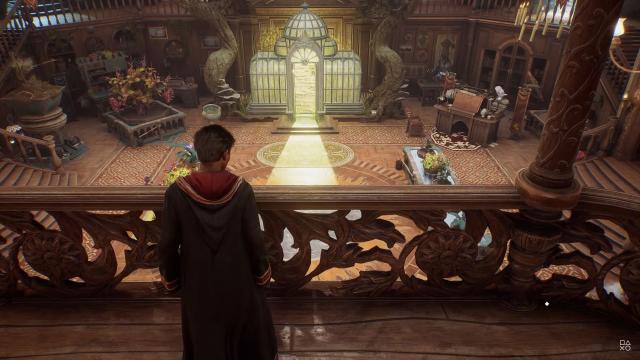
One of the last major gameplay mechanic introductions that you’ll encounter is the Room of Requirement. This room serves as an area for resources; you can grow ingredients to make potions or items to help you in combat, identify special clothing, upgrade or add traits to clothing, and even play with a variety of mythical beasts that you can collect. The room can be changed aesthetically too, allowing the player to make it more personalized. Unfortunately, it feels a bit too tacked on to the general experience and, in my opinion, interrupts the flow of the game more than it adds to it. It's also pretty much separated from everything else in the game, so I never actually wanted to there unless it was absolutely necessary. In reality, the most important thing you'll use it for is grabbing ingredients from your collected critters in order to upgrade your clothing. The customization options are also just a bit too limited for me to feel the desire to try and personalize the place, and once you’ve grown ingredients you can just occasionally visit to collect them.
Though the first week of my experience with Hogwarts Legacy was bumpy from a technical standpoint, I'm overall left having had a great experience courtesy of Portkey Games. Throughout my time with the game I could truly feel the care and consideration that the developers had poured into it to ensure that it felt like a bona fide Harry Potter experience. Even if you were to strip away the Harry Potter franchise integration, though, you would still find a surprisingly refreshing and extremely solid title that feels substantial in size, scope, and variety without ever wearing out its welcome. There are a couple of key improvements that could bring it right up there with the best of them. But even without those improvements, Hogwarts Legacy stands out and is one of the more enjoyable video game experiences I’ve had in the last year. The developers have not just created a great game, but they’ve fulfilled exactly what I was looking for in a Hogwarts experience. Now, if you’ll excuse me, I think I’ll go back and finish up the series.









